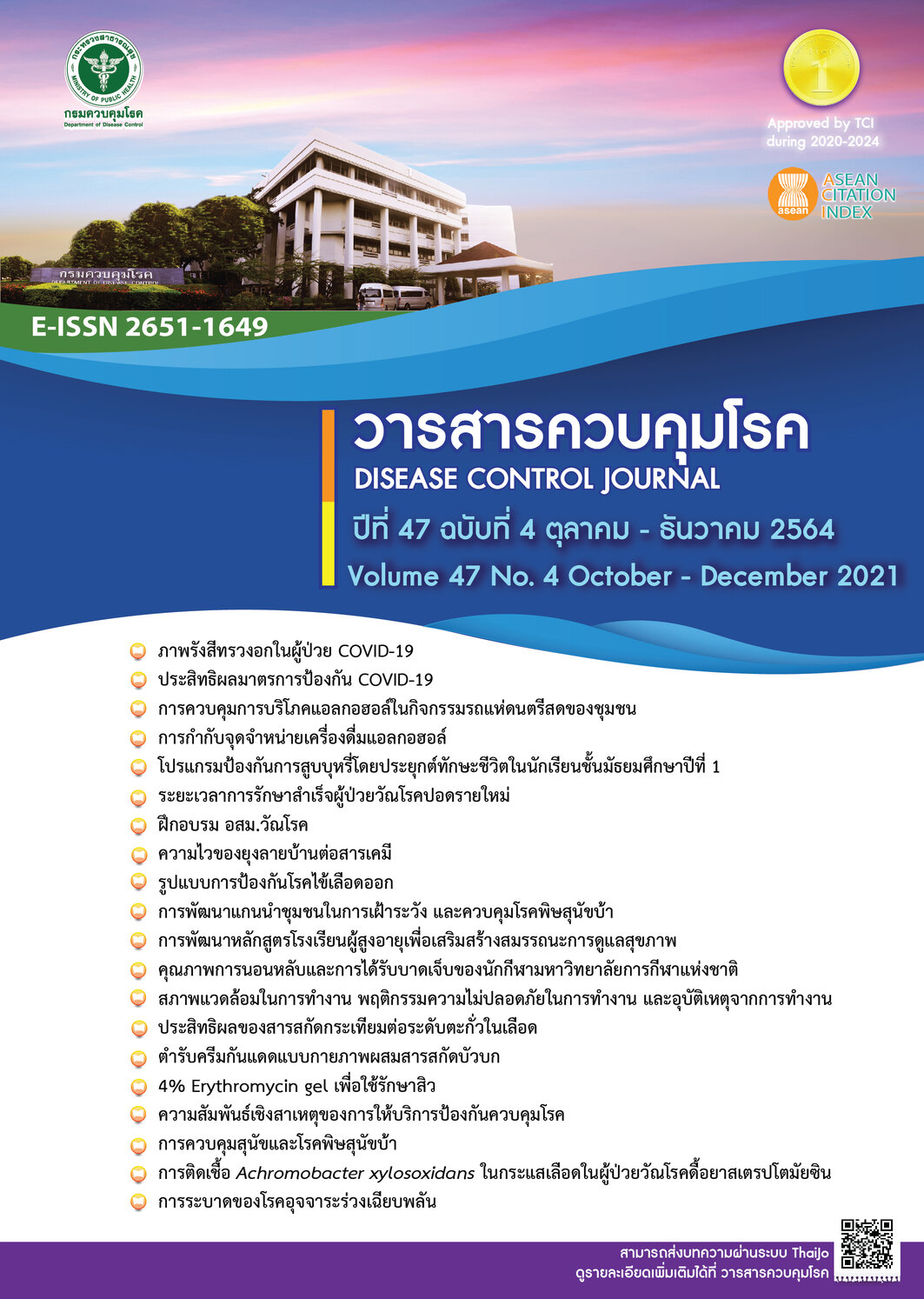Effectiveness of preventive measures against COVID-19 in public health region No.3, 2020
DOI:
https://doi.org/10.14456/dcj.2021.78Keywords:
COVID-19, Effectiveness, MeasuresAbstract
The objectives of this research were to evaluate the effectiveness of preventive measures against COVID-19 in the components of context, input, process, product, impact, effectiveness, sustainability, and knowledge transportability and to obtain policy and practical recommendations. This research was mixed method model which included qualitative and quantitative research design follow with CIPPIEST Model. The research instruments were 1) Qualitative instrument was the structured interview form 2) Quantitative instrument was a questionnaire. The 2 sample groups were 1) 55 provincial executive officers and the health care workers selected by purposive random sampling 2) 383 entrepreneurs and people affected by COVID-19 outbreak which 15 to 60 years old selected by random sampling. Data were collected in 5 provinces in Public Health Region No.3 during June to August 2020. The quantitative data were analyzed by using descriptive statistics and qualitative data were analyzed with content analysis method. The finding of this research revealed that preventive measures against COVID-19 using CIPPIEST model in 8 processes as follow: 1) context 2) input 3) process 4) product 5) impact 6) effectiveness 7) sustainability and 8) knowledge transportability. The recommendations were 1) The federal agencies should command to do local quarantine in every provinces at the same ways 2) The public relation were need to media support establishment and people about disease prevention.
Downloads
References
Office of efinance. Prime minister promulgate emergency degree COVID-19 [Internet]. 2020 [cited 2020 Dec 2]. Available from: https:// www.efinancethai.com/LastestNews/Latest- NewsMain.aspx?ref=A&id=Smd5VE5XNFN- GazQ9.
Epidemiology and Public Health Emergency Re- sponse. Situation corona virus 2019 region 3 No.3. 2020, Dec 24; Office of Disease Preven- tion and Control Region 3rd Floor 4 Meeting Room, Nakhon Sawan Province. Nakhon Sawan: Epidemiology and Public Health Emergency Re- sponse; 2020. p. 3-4.
Jitsawangsophid S. Effectiveness of project rural development loans of government saving bank: a case study house wife group Banhae Ang Thong province. Chonburi: Burapha University; 2012. 128 p. (in Thai)
Thanongkij R, Poboon C, Phoochinda W. Eval- uation of the effectiveness of community energy learning centers. JCDR-HS. 2017;10(4):163- 74.
Manasim K. The Evaluation of instruction in the government curriculum (english program), Pathumthep Witthayakarn School, Nongkhai Province. Nongkhai: Pathumthep Witthayakarn School; 2015. p. 57.
Chintapanyakun T, Ruaengsri S, Laksana K, Lhongsap P. The new curriculum evaluation: CIPPIEST model. Journal of Optoelectronical Nanostructures. 2017;9(2):209.
Singchongchai P, Khampalikit S, Nasae T. Nursing research: principle and process. Faculty of Nursing, Prince of Songkla University. Songkhla: Songkla University; 2006. 143 p.
Vanichbuncha K. Statistics analysis: statistics for management and research 13th ed. Bangkok: Chulalongkorn University; 2011. p. 6-27.
Hungmitr C, Makkawan S, Thitinunthiwat N. Evaluating of effectiveness for surveillance and law enforcement according to alcohol control act, 2008 in health regional area 3. Nonthaburi: Min- istry of Public Health; 2017. p. 61-2.
Office Regional Heath 3 No.3. Report follow progress of situation Corona Virus 2019 in region 3 No.3. In: Noi-kham A. Minutes meeting Committee of Incident Command System Region 3 No.3; 2020 Dec 25; Meeting room floor 5 Building 100 Year of Thai Public Health Sawan Pracharak Hospital (Green Hill), Nakhon Sawan Province, Thailand; 2021. p. 6-11. (in Thai)
Prasertsook M, Mongkalangkoon N, Meengun K, Karnkan O, Nalam P, Luang-on W, et al. Evaluation of the surveillance, prevention and control of Influenza in public health services in Thailand during the year 2015. Dis Control J. 2017;43(3):316-28. (in Thai)
Downloads
Published
How to Cite
Issue
Section
License
Articles published in the Disease Control Journal are considered as academic work, research or analysis of the personal opinion of the authors, not the opinion of the Thailand Department of Disease Control or editorial team. The authors must be responsible for their articles.






